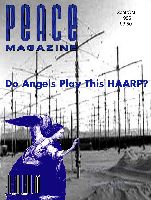
Peace Magazine Sep-Oct 1996, page 6. Some rights reserved.
Search for other articles by Ken Simons here
A right-wing British journalist has called it "the best free show in town." For the past two years, Court 35 of the Royal Courts of Justice has been the scene of an exhaustive legal struggle between two environmental activists and the world's largest fast-food enterprise, the $26 billion a year McDonald's Corporation.
The story began in 1985 when London Greenpeace (L.G.) - an anarchist collective which predated, and has never been affiliated with, Greenpeace International in Britain - produced a factsheet called "What's Wrong With McDonald's." The eight-page leaflet looked at the hamburger giant's record on labor relations, the environment, nutrition, and animal welfare. It had been circulating in small numbers for some time before McDonald's U.K. launched libel proceedings against five L.G. members in 1990, alleging that they had been involved in the distribution of defamatory material.by the time the case went to court, in June 1994, the five had become two. Dave Morris, a single parent and former postal worker, and Helen Steel, a gardener, chose to defend themselves in court rather than agree to a quiet apology as the other three had done. McDonald's representatives estimated that it would all be over in weeks, a drastic miscalculation.
In the two years since the case began, some of the most damning evidence has been given by McDonald's executives themselves. "I can see [the dumping of waste] to be a benefit, otherwise you will end up with lots of vast, empty gravel pits all over the country," explained Ed Oakley, McDonald's Head of Purchasing in the U.K.
In response to a defence question, "Is Coca-Cola nutritious?," David Green, Senior Vice-President of Marketing (U.S.) said it "provide[s] water, and I think that is part of a balanced diet." The company's consultant on nutrition stated that "junk food" was simply "whatever a person doesn't like."
Steel and Morris have represented themselves throughout the two-year trial, as there is no legal aid provision for libel cases. This has been an advantage at times; the two have been more likely to cut through legal formalities (and get away with it) than if they were represented by a barrister. At the same time, their legal skills have grown immensely during the years of skirmishing with McDonald's high-powered lawyers.
The biggest single expense for the defence campaign has been the calling of witnesses, many of them former McDonald's employees and executives. So far the court has heard evidence on nutrition, environmental issues, animal welfare, and labor relations. Questions around the L.G. factsheet, its production, and distribution are currently being raised.
It was well known around the movement that McDonald's had assigned investigators to infiltrate the group in the late '80s. At one meeting in 1990, three of the four people present were spies for McDonald's. Infiltrators also played an active role in distributing the contentious factsheets.
Sid Nicholson, McDonald's U.K. vice-president and former head of security, admitted the company employed "enquiry agents," but claimed the number of agents monitoring L.G., attending meetings, and participating in events would not affect the direction of the group.
The case is expected to end at the end of 1996 or the beginning of 1997. Whatever the verdict, most observers agree that McDonald's has already lost the public relations argument. The two years of press coverage have focused public attention on the corporation's record as never before, revealing information that the 1985 L.G. factsheet did not even hint at.
Since March this year, McLibel supporters have been publishing a "McSpotlight" homepage on the World Wide Web [http://www/mcspotlight.com]. This has generated nearly as much copy as the trial itself; included among the many links is a guided tour of the official McDonald's website, with a point-by-point deconstruction of the corporation's own claims. Interestingly, the official site [http://www.mcdonalds.com] has no easily accessible information on the court case, and certainly does not provide a link to the McSpotlight site.
One of the many ironies of the case is that the original "What's Wrong With McDonald's" factsheet was not aimed specifically at McDonald's but at corporate culture in general: "What's wrong with McDonald's is also wrong with all the junk-food chains like Wimpy, Kentucky Fried Chicken, Wendy, etc. ... The rise of these firms means less choice, not more," the leaflet notes. McLibel campaigners stress this in their background information: the struggle is not that of two activists against one corporation, but of people against a corporate culture they see as homogenizing and destructive.
Ken Simons is former editor of Peace News, which had offices a floor below London Greenpeace.

Peace Magazine Sep-Oct 1996, page 6. Some rights reserved.
Search for other articles by Ken Simons here